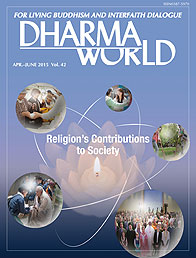April-June 2015, Volume 42(PDF)
Religion’s Contributions to Society
Religion aims to satisfy the human need for spiritual fulfilment. At the same time, religious values and practices are often deeply entwined in the fabric of people’s daily lives, making social involvement an essential part of religious activities.
Religion’s many kinds of contributions to society have a long history. People in faith communities have delivered crucial social services.
Christianity stresses that religious communities should provide social services, that is, offer a helping hand to people in need. Practical charity flows out of these communities. Social contributions such as almsgiving have been deeply rooted in Islam and actively carried out in Muslim communities. Many Buddhist communities, despite a general conception that Buddhism is indifferent to the world, have provided social services in many areas of life.
In Japan, since the March 2011 earthquake and tsunami, more people have begun to recognize that faith-based organizations can benefit society through relief and social welfare programs.
Religion’s social contributions are motivated by the aspiration to liberate all people from suffering and create a world based on religious principles. It is an activity targeting society in general, often independent of proselytization.
The problems that society faces are multifaceted and complex. Religious organizations must address a wider range of new, challenging problems that involve their members and society, to transform people’s suffering into happiness and confrontation into harmony, on local, regional, and global levels.
We hope to take an overview of the development of religion’s social contributions and see how religious leaders and communities as well as the general public consider the importance of social contributions as part of religious activities. We also hope to focus on examples of religion’s contributions to society.























































































